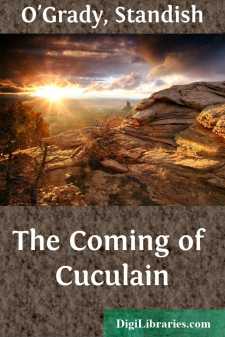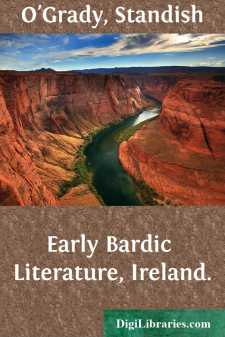Categories
- Antiques & Collectibles 13
- Architecture 36
- Art 48
- Bibles 22
- Biography & Autobiography 813
- Body, Mind & Spirit 142
- Business & Economics 28
- Children's Books 17
- Children's Fiction 14
- Computers 4
- Cooking 94
- Crafts & Hobbies 4
- Drama 346
- Education 46
- Family & Relationships 57
- Fiction 11829
- Games 19
- Gardening 17
- Health & Fitness 34
- History 1377
- House & Home 1
- Humor 147
- Juvenile Fiction 1873
- Juvenile Nonfiction 202
- Language Arts & Disciplines 88
- Law 16
- Literary Collections 686
- Literary Criticism 179
- Mathematics 13
- Medical 41
- Music 40
- Nature 179
- Non-Classifiable 1768
- Performing Arts 7
- Periodicals 1453
- Philosophy 64
- Photography 2
- Poetry 896
- Political Science 203
- Psychology 42
- Reference 154
- Religion 513
- Science 126
- Self-Help 84
- Social Science 81
- Sports & Recreation 34
- Study Aids 3
- Technology & Engineering 59
- Transportation 23
- Travel 463
- True Crime 29
The Coming of Cuculain
by: Standish O'Grady
Description:
Excerpt
In this age we read so much that we lay too great a burden on the imagination. It is unable to create images which are the spiritual equivalent of the words on the printed page, and reading becomes for too many an occupation of the eye rather than of the mind. How rarely—out of the multitude of volumes a man reads in his lifetime—can he remember where or when he read any particular book, or with any vividness recall the mood it evoked in him. When I close my eyes, and brood in memory over the books which most profoundly affected me, I find none excited my imagination more than Standish O'Grady's epical narrative of Cuculain. Whitman said of his Leaves of Grass, "Camerado, this is no book: who touches this touches a man" and O'Grady might have boasted of his Bardic History of Ireland, written with his whole being, that there was more than a man in it, there was the soul of a people, its noblest and most exalted life symbolised in the story of one heroic character.
With reference to Ireland, I was at the time I read like many others who were bereaved of the history of their race. I was as a man who, through some accident, had lost memory of his past, who could recall no more than a few months of new life, and could not say to what songs his cradle had been rocked, what mother had nursed him, who were the playmates of childhood or by what woods and streams he had wandered. When I read O'Grady I was as such a man who suddenly feels ancient memories rushing at him, and knows he was born in a royal house, that he had mixed with the mighty of heaven and earth and had the very noblest for his companions. It was the memory of race which rose up within me as I read, and I felt exalted as one who learns he is among the children of kings. That is what O'Grady did for me and for others who were my contemporaries, and I welcome these reprints of his tales in the hope that he will go on magically recreating for generations yet unborn the ancestral life of their race in Ireland. For many centuries the youth of Ireland as it grew up was made aware of the life of bygone ages, and there were always some who remade themselves in the heroic mould before they passed on. The sentiment engendered by the Gaelic literature was an arcane presence, though unconscious of itself, in those who for the past hundred years had learned another speech. In O'Grady's writings the submerged river of national culture rose up again, a shining torrent, and I realised as I bathed in that stream, that the greatest spiritual evil one nation could inflict on another was to cut off from it the story of the national soul. For not all music can be played upon any instrument, and human nature for most of us is like a harp on which can be rendered the music written for the harp but not that written for the violin. The harp strings quiver for the harp-player alone, and he who can utter his passion through the violin is silent before an unfamiliar instrument. That is why the Irish have rarely been deeply stirred by English literature though it is one of the great literatures of the world. Our history was different and the evolutionary product was a peculiarity of character, and the strings of our being vibrate most in ecstasy when the music evokes ancestral moods or embodies emotions akin to these. I am not going to argue the comparative worth of the Gaelic and English tradition. All I can say is that the traditions of our own country move us more than the traditions of any other. Even if there was not essential greatness in them we would love them for the same reasons which bring back so many exiles to revisit the haunts of childhood. But there was essential greatness in that neglected bardic literature which O'Grady was the first to reveal in a noble manner. He had the spirit of an ancient epic poet. He is a comrade of Homer, his birth delayed in time perhaps that he might renew for a sophisticated people the elemental simplicity and hardihood men had when the world was young and manhood was prized more than any of its parts, more than thought or beauty or feeling....



